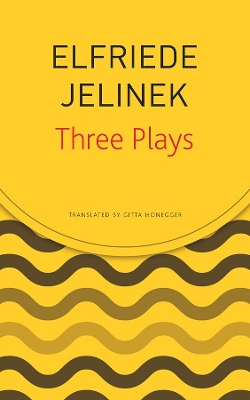German List
3 total works
Although Elfriede Jelinek is an internationally recognised playwright, her plays are difficult to find in English, which makes this new volume all the more valuable. In Rechnitz, a chorus of messengers reports on the circumstances of the massacre of 180 Jews, an actual event that took place near the AustrianHungarian border town of Rechnitz. In The Merchant's Contracts, Jelinek brings us a comedy of economics, where the babble and media spin of spectators leave small investors alienated and bearing the brunt of the economic crisis. And in Charges (The Supplicants), Jelinek responds to the immeasurable suffering among refugees fleeing death, destruction and political suppression, and asks what refugees want, how we as a society view them, and what political, moral and personal obligations they impose on us.
Nobel Prize winner Elfriede Jelinek is known as a writer who works in response to contemporary crises and cultural phenomena. Perhaps none of her works display that quality as clearly as On the Royal Road. Three weeks after Donald Trump’s election, Jelinek mailed her German editor the first draft of this play, which turns out to be a stunningly prescient response to Trump and what he represents. In this drama, we discover that a “king,” blinded by himself, who has made a fortune with real estate, golf courses, and casinos, suddenly rules the United States, and the rest of the people of the world rub their eyes in disbelief until no one sees anything anymore.
As topical as the evening news, yet with insight built on a lifetime of closely observing politics and culture, On the Royal Road brings into focus the phenomenon of right-wing populism, which spreads like a virus and has a lasting effect on global politics. Carefully perched somewhere between tragedy and grotesque, high-pitched and squeamish, Jelinek in this work questions her own position and forms of resistance.
In Greek mythology, it is Hera who blinds the hero Heracles, so that, in a fit of fury, he kills his own family. In the twenty-first century, the gods have another name. So did the three young men who stormed a magazine’s editorial office and a Jewish supermarket in Paris in January 2015 and murdered twelve people. The blind fury, however, remained and more virulent than ever, not least because the weapons were so much more effective.
In this raging text, arguably one of her darkest, Nobel Prize winner Elfriede Jelinek investigates topical political events in the context of enduring history and myths. Fury expresses itself not only multi-voiced and from the changing perspective of Islamist terrorists (and their special hatred of Jews), in the shape of furious German citizens, individual narcissistic humiliation, or brutal distribution battles around the globe. Rather, fury also appears as the motor that has driven people with a devastating force for centuries.
With her characteristic linguistic power, Jelinek articulates her own disconcertedness in the face of these crimes. In passing, she returns repeatedly to the contradiction between religious laws against representation and the deluge of images online, where movies of assassination, severed heads, and other atrocities are exhibited for millions to see. Fury is a compact grand epic that starts in primal times and attempts to describe the indescribable, relating the inexplicable in our times.


